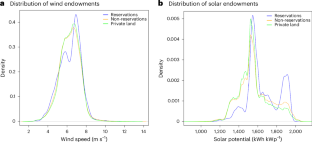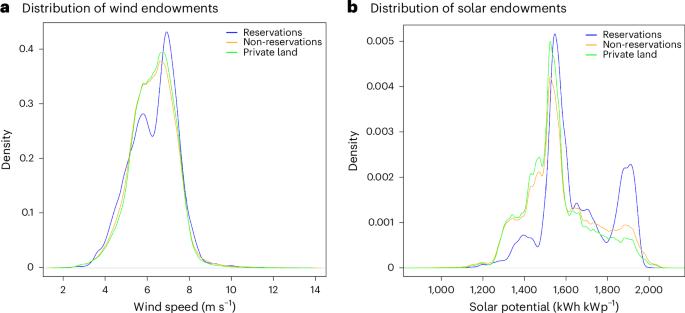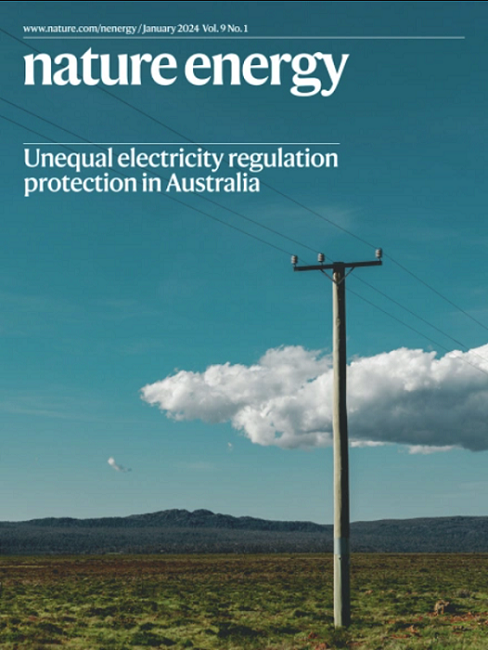美国印第安人社区风能和太阳能的经济潜力
IF 49.7
1区 材料科学
Q1 ENERGY & FUELS
引用次数: 0
摘要
美国印第安人保留地的可再生能源开发能否减轻贫困?本文结合风能和太阳能禀赋、保留地特征和公用事业规模可再生能源项目的数据,提出了三点见解。首先,殖民时期建立保留地的过程有意剥夺了部落的其他自然资源,却无意中为他们留下了有利的风能和太阳能资源,尤其是在收入最低的保留地。其次,尽管禀赋条件优越,但可再生项目却很少:与邻近的同类土地相比,保留地建立风力发电厂的可能性要低 46%,建立太阳能发电厂的可能性要低 110%。第三,如果这种差距持续存在,根据对 2050 年可再生能源需求的预测,部落可能会放弃超过 190 亿美元的租赁和税收收入。我们强调了有助于解释这种差异的障碍,如监管的复杂性和不确定性,并强调这并不是呼吁将联邦能源优先权强加给不愿意的部落。本文章由计算机程序翻译,如有差异,请以英文原文为准。


Economic potential of wind and solar in American Indian communities
Could renewable energy development on American Indian Reservations alleviate poverty? This Article combines data on wind and solar endowments, reservation characteristics and utility-scale renewable energy projects to offer three insights. First, the colonial process of reservation creation that intentionally deprived tribes of other natural resources unintentionally left them with favourable wind and solar, especially on reservations with the lowest-income populations. Second, despite favourable endowments, renewable projects are rare: reservation lands are 46% less likely to host wind farms and 110% less likely to host solar than comparable adjacent lands. Third, if this disparity persists, tribes may forgo over US$19 billion in lease and tax earnings that could be accrued under forecasts of renewable energy demand through 2050. We highlight barriers—such as regulatory complexity and uncertainty—that help explain this disparity and emphasize this is not a call to impose federal energy priorities on unwilling tribes. New research examines disparities in renewable energy development on American Indian reservations relative to adjacent lands. Results highlight barriers contributing to these disparities and the scope for poverty alleviation, if eliminated, is quantified.
求助全文
通过发布文献求助,成功后即可免费获取论文全文。
去求助
来源期刊

Nature Energy
Energy-Energy Engineering and Power Technology
CiteScore
75.10
自引率
1.10%
发文量
193
期刊介绍:
Nature Energy is a monthly, online-only journal committed to showcasing the most impactful research on energy, covering everything from its generation and distribution to the societal implications of energy technologies and policies.
With a focus on exploring all facets of the ongoing energy discourse, Nature Energy delves into topics such as energy generation, storage, distribution, management, and the societal impacts of energy technologies and policies. Emphasizing studies that push the boundaries of knowledge and contribute to the development of next-generation solutions, the journal serves as a platform for the exchange of ideas among stakeholders at the forefront of the energy sector.
Maintaining the hallmark standards of the Nature brand, Nature Energy boasts a dedicated team of professional editors, a rigorous peer-review process, meticulous copy-editing and production, rapid publication times, and editorial independence.
In addition to original research articles, Nature Energy also publishes a range of content types, including Comments, Perspectives, Reviews, News & Views, Features, and Correspondence, covering a diverse array of disciplines relevant to the field of energy.
 求助内容:
求助内容: 应助结果提醒方式:
应助结果提醒方式:


